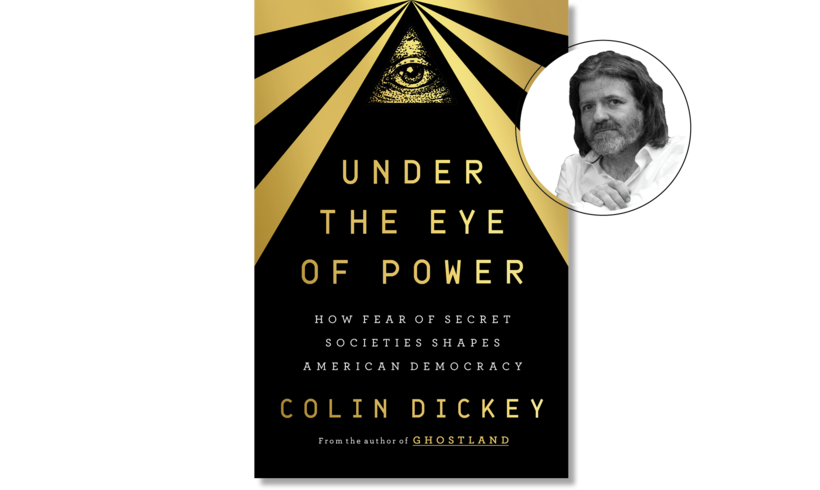In “Under the Eye of Power,” an American Conspiracy Story
How do we account for the unfortunate phenomenon that is Robert F. Kennedy Jr.? Blessed at birth with the noblest of American political names, he has, at age 69, launched a pernicious Democratic primary challenge to Joe Biden fueled by conspiracy theories. In the R.F.K. Jr. worldview, vaccine mandates are a scheme to enrich pharmaceutical executives, the coronavirus may have been intentionally engineered to spare Jews and Asians, and 5G networks are tools governments use to “harvest our data and control our behavior … allow[ing] them to punish us from a distance and cut off our food supply.”
Does his campaign represent what America is becoming—a strange new land in which paranoia is so rampant that even a Kennedy trades the customs of Camelot for those of QAnon? Or could it be that R.F.K. Jr. and the host of other conspiracist provocateurs in contemporary politics in fact represent something different, if no less disturbing: the country America has always been?
The writer Colin Dickey, in his ambitious and provocative book Under the Eye of Power: How Fear of Secret Societies Shapes American Democracy, makes a persuasive case for the latter. Touring American history from the witch hysteria in Salem to contemporary fantasies about reptile invaders disguised as humans or child traffickers in pizza parlors, Dickey uncovers an essential American urge: to reject the unsettling mystery of a chaotic, complex world in favor of catchall theories in which everything can be tied back to powerful, hidden intriguers launching sprawling, sinister plots.
Today, we associate this urge with the kooky fringe. But, as Dickey demonstrates, it owes much to the American republic’s enlightened, humanist roots. The nation’s founders embraced the idea of a rational universe in which human actions shaped events. “Anything that happened,” Dickey writes, “no matter how seemingly chaotic or bizarre, could be traced to the workings of someone. Which could only mean that any strange happenings had to be the work of hidden actors whose motives and purposes were not immediately knowable.”
When applied to the blood sport of electoral politics, this thinking quickly produced useful bogeymen: secret societies that covertly subverted the people’s will. These specters would dominate much of 19th-century political life. In the election of 1800, Thomas Jefferson’s opponents in Federalist New England proclaimed him the tool of a global Jacobin Illuminati, determined to stamp out American religion. In the 1850s, the anti-immigrant Know-Nothing Party warned of Catholic sleeper cells who aimed to supplant the Constitution with Vatican rule.
Dickey nimbly and frequently illustrates the resonance between these long-abandoned conspiracy theories and the kind you can find on 4chan today. Particularly engaging is his description of an 1834 Boston riot in which a Protestant mob, egged on by tales of depraved Catholic nuns sexually corrupting innocent girls they were charged with educating, ransacked and burned an Ursuline convent. In the episode, Dickey sees elements of the panic over supposed L.G.B.T.Q. “groomers” today. “The slander,” he writes, “is the same: a cabal of sexual deviants are attempting to gain control of the education of young people.”
Only in the 20th century, Dickey argues, did conspiracy theories disappear from the political mainstream as responsible thinkers came to understand that chance and chaos can shape events as powerfully as any act of man.
Still, even when banished to the fringes, conspiracists retained their power, thanks to their perennial ability to explain away the unsettled, fast-changing world. After all, Dickey writes, “the goal of any conspiracy theory is to soothe, calm and reassure.” Accepting a world governed by inanimate, unstoppable forces can lead to feelings of hopelessness. But a worldview in which all convulsive change is the fault of the deep state or George Soros offers a simple solution: root the bad guys out.
Today, the conspiracists have come in from the cold. Before losing his show on Fox News, Tucker Carlson embraced the great-replacement theory of the white-nationalist movement. At a rally last fall, Donald Trump played a song nearly identical to the QAnon anthem, “Wwg1wga” (an acronym for QAnon’s motto: “When we go one, we go all). Kennedy poses no real threat to Biden but has occasionally polled as high as 20 percent in Democratic primary polls.
Observing these developments, we can take some reassurance from Dickey’s larger point, that all conspiracy theorists eventually lose their power, unable to account for the gap between the world they’ve predicted and the world that is.
But what about the damage they can do in the meantime? Perhaps the most unsettling section of Under the Eye of Power deals with the 1850s, a moment when the country was deeply divided over passionately held moral beliefs. Conspiracy theories proliferated and were easily digested by mainstream figures in each of the major political parties. These politicians spoke of the urgent need to save the country from malign forces secretly perverting the rightful order. Then came the Civil War.

llustration: Heritage Images/Topfoto. Photos: Anna Moneymaker/Getty Images (Kennedy); Moussa81/iStock/Getty Images (tinfoil hat); Rick Loomis/Getty Images (QAnon); © Rynn Reed (Dickey)


